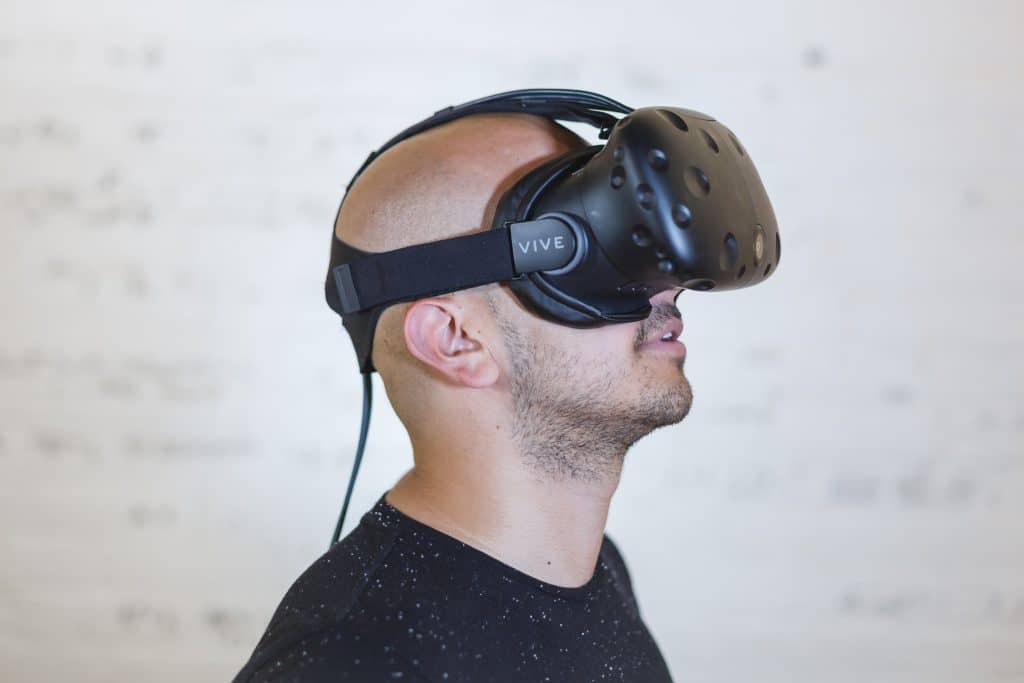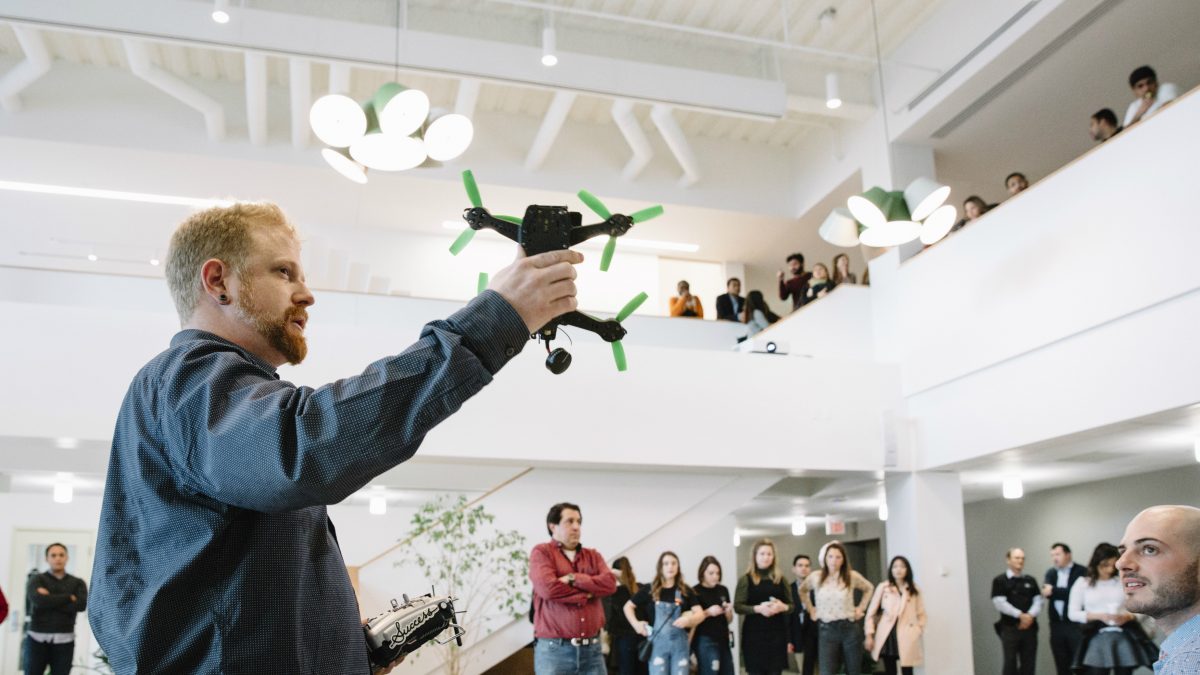This article was originally published in Vol.13 of EFMD Global Focus, the European Foundation for Management Development Business Magazine.
This article is also available as a podcast, listen now
Business students should be more knowledgeable about new technologies say Mukul Kumar and Johan Roos. Business schools need to accelerate how they enable students to partner with engineers and scientists, bring tech-driven innovations to market in responsible ways, and understand the evolving applications of disruptive technologies in society.
STEM (science, technology, engineering and mathematics) technologies are driving new products, services and business models and doing so at an accelerating pace. Consequently, companies seek business graduates with knowledge, skills, and mindsets about data analytics, machine learning, and other so-called “exponential” technologies. Three years ago in this magazine, one of your current writers (Johan Roos) called for business schools to help students become more aware of advances in artificial intelligence, biomedicine, neuroscience, nano-enabled engineering, and other rapidly advancing STEM fields.
He argued then that “business students need to be ‘conversant’ in STEM if they are to have the intellectual capacity and skills to survive in the technology-driven organizations of the future”. Yet it is our impression that many businesses school still do not sufficiently shape either the educational experience nor the mindsets of graduates for the technological developments that will dominate their careers. Over the last two years, Hult International Business School has initiated and implemented an initiative to change this.
Many businesses school still do not sufficiently shape the mindsets of graduates for the technological developments that will dominate their careers.
We are transforming the curriculum and the learning experience so that Hult students, primarily our specialized masters students, will have the required future mindset and skills. We have tackled these future-oriented challenges – understanding technologies, exploring business model components and developing a future mindset – by way of a new set of courses and curricular enhancements.
We have already created and deployed a core course to build The Future Mindset plus a portfolio of nine short Exponential Technology Nano Courses to inspire curiosity and creativity in the business application of disruptive technologies. We decided early in our design process to model this future mindset ourselves by approaching our curricular innovations using agile building methods and randomized experiments with variants (A/B testing) as well as leveraging new learning technologies and experimenting with new delivery models.
Our future-oriented programme has been deployed to nearly one thousand master of international business students based in our Dubai, London, Boston and San Francisco campuses. Overall, students and faculty alike have welcomed this innovation, as evidenced in student evaluations exceeding an average of 4.6/5.0 and faculty focus groups. The programme is currently being adapted to the Hult undergraduate programme in international business offered in London, Boston and San Francisco.
Developing a future mindset
To develop a future mindset ready to leverage disruptive technologies and new business models, we set out to address a key question: “How are you transforming your mindset in an ever-changing, hyper-connected world?” Crucial inspiration for shaping this future mindset came from a renowned investor letter from Jeff Bezos at Amazon: “…what does day two look like? Day two is stasis. Followed by irrelevance. Followed by excruciating, painful decline. Followed by death. And that is why it is always day one”.
The Future Mindset course design focuses on giving students a dynamic experience in a large-scale creation, using the central theme of “Designing the City of the Future”. It taps into the five major business cities in which we have Hult campuses (San Francisco, Boston, London, Dubai, and Shanghai) as the core “playground” for the student experience. Instructional topics covered include design thinking, data analytics, innovation approaches, platform economics, and agile management.
The course concludes with a team contest in which students present their innovative ideas for the city of their campus, along with the requirement that they pivot based on new stimulus provided half-way through the course.


Exposure to disruptive technologies
In the program, the exposure to disruptive technologies has been achieved by designing a set of innovative “Nano courses” to teach students the business implications of the disruptive technologies dramatically influencing tomorrow’s landscape. Each Nano course is built in conjunction with a world-renowned industry expert and structured in eight modules covering the basics of how the technology works, potential applications, major players driving the technology, the likely development/maturity timeline, legal and regulatory issues, and the key challenges that need to be overcome for the full potential to be realised. Three virtual live sessions invite industry experts and facilitators to share their experiences and real-life cases while also enabling students to brainstorm live cases for their final presentations. Currently, nine Nano courses are on offer to students:
- Blockchain
- Autonomous vehicles
- Robotics
- Internet of things
- Energy of the future
- Artificial intelligence
- Cybersecurity
- Augmented/virtual reality
- Genome editing
Developing and testing the courses
Hult does not use any textbooks for these future-oriented topics. Instead, we developed a new approach to create The Future Mindset and Nano courses and to deploy them simultaneously on all our campuses. The courses use a wide range of sources and perspectives to provide a balanced view of the opportunities and risks, including ethical considerations, and to encourage convergent thinking in terms of developing new business models. They are taught in a blended format with a mix of in-person facilitated sessions, in-person group activities and individual online learning.
We have found that offering blended learning is challenging. There is a clear onus on the learner to manage his or her learning and adequately prepare for the face-to-face sessions. It is vital that the lead professor guides and supports students through the various blended modalities and that the right tools for learning are provided at the right times. It is equally vital to provide sufficient space and support for faculty to experiment and gain comfort with new topics and pedagogies.
The Future Mindset course design focuses on giving students a dynamic experience in a large-scale creation, using the central theme of ‘Designing the City of the Future’
Global testing
Last academic year we ran multiple experiments with students across the world to refine the format, content, and interactivity of the courses in order to achieve the highest quality of learning. Positive feedback from students was that the flow of the content (including videos, readings, lectures, polls, discussions, and quizzes) was intuitive and that the diversity of media was highly engaging. Students placed particular value on the flexibility, self-paced learning and support in preparing properly for the interactive live webinars.
During the development of the courses, a range of innovative new tools was tested for polling, discussion, interactive videos, virtual presentations, peer feedback, and group member evaluation. These tools created a sense of class cohesion and community, making the course interactive and engaging. All these tools are integrated with our LMS system (Canvas) and are now being requested for wider deployment across our faculty.
Tracking engagement and measuring results
To evaluate the student satisfaction of the Nano courses after completion, we used metrics from student course evaluations as well as pre- and post-course surveys. We monitored student engagement by extracting real-time module progression data from Canvas and Google Analytics. This data provided us with information to spot trends, do A/B tests, track behavior and identify improvement areas. Moreover, we built tools to identify individual students who were struggling and offer them appropriate support (such as additional videos and coaching/TA support.)
These courses delivered the highest student evaluations we have seen for any set of new courses widely deployed in our curriculum and the written commentary has been inspiring. As a result, we are rapidly incorporating adjustments and deploying these curricular enhancements to a range of other degree programs including undergraduate, MBA and Executive MBA.
Conclusion
Some argue persuasively that business schools ought to be reaching out aggressively to attract STEM students and pull them into business programs. That may be a new and exciting market segment for many deans. In Hult, however, we take another approach. We believe it is first the responsibility of business schools to prepare all their students, no matter the undergraduate background, for a rapidly changing future where technology plays a central role in the development of both business and society. Business schools should simply be part of the STEM conversation as soon as possible.
Our Future Mindset and Nano courses mark a major step forward for our school in developing an innovative approach to teaching students about STEM technologies and the ways in which they can be leveraged to provide sustainable solutions for the businesses of tomorrow. We have begun the journey to bring Hult and our students into the STEM age and while we have much to learn, we in Hult are thrilled about the results so far.
About the authors


Dr. Mukul Kumar
Dr. Kumar is Chief Innovation Officer at Hult International Business School. He holds a PhD in International Economics from Princeton and Bachelor of Science Degrees in Mathematics and Economics from MIT. He has two decades of experience building and leading high-growth advisory businesses and education institutions.


Dr. Johan Roos
Dr. Johan Roos is a Swedish organizational theorist, and Chief Strategy Officer at Hult International Business School, known for his work on intellectual capital, co-invention of LEGO Serious Play™, and extensive writing on strategy and innovation. Follow Johan on Twitter @drjohanroos
Find out more about Hult’s disruptive business degree programs.
Like game changers? Break the mould in the business world with a Masters in Disruptive Innovation from Hult. To learn more, take a look at our blog Day of Disruption: Undergrads build a new lifestyle brand during Unilever Hackathon, or explore overall business challenges with a Masters in International Business instead. Download a brochure or get in touch today to find out how Hult can help you to find out everything about the business world, the future, and yourself.



